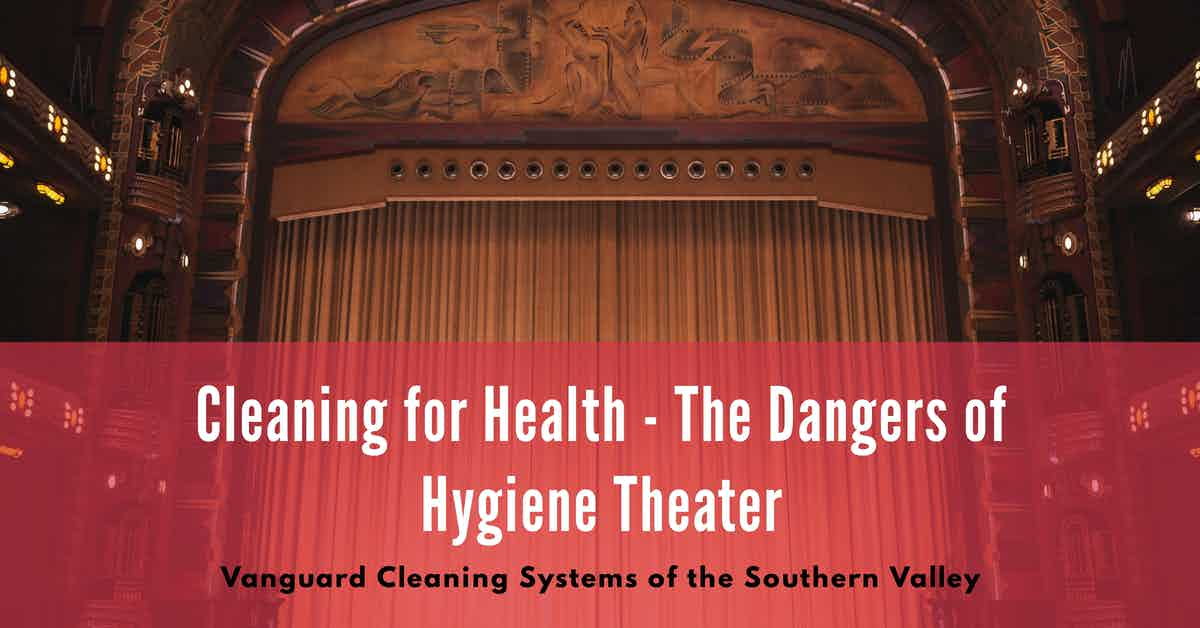Hygiene theater, a term made famous during the height of the pandemic, is a dangerous, unnecessary, and wasteful practice that fails in every regard to thwart the advance of SARS-CoV-2 or protect facility occupants from the dangers commonly found on commonly touched surfaces and inside public buildings.

The Dangers of Hygiene Theater and Why it Needs to Stop
For years, clean for health advocates labored to propel the merits of their cause to the forefront of public discourse.
Cleaning for appearance was a dangerous and wasteful practice and ignored the science of indoor environment quality and epidemiology.
Then, seemingly overnight, a microscopic foe emerged--shining a painful light upon the often woefully inadequate means by which we sanitized our homes, schools, and offices.
Panicked, many sought to destroy the virus aggressively and by any means necessary.
Nightly "deep cleans" were scheduled and rigidly practiced.
Toxic disinfectants were sprayed by untrained, ill-equipped, unprepared, and sometimes unwilling participants indiscriminately throughout every occupiable corner of buildings across the country.
It seemed logical at the time.
In those frantic early months of the pandemic, routes of transmission of the virus were not well-characterized.
Everything and anything seemed a potential danger, from touching a countertop to eating an apple to walking in the street.
In response, the most germophobic behavior suddenly made perfect sense.
Hand sanitizers proliferated at every store entrance, in pockets and at home.
Indeed, hand sanitizer sales in 2020 jumped 600%.
The actual scope of the damage done--the waste and pollution created, the long-term negative health impacts still years from detection--may never be fully tallied.
What is known is what the practice failed to accomplish--even briefly halting the spread of SARS-CoV-2.
Even now, the practice of hygiene theater--cleaning and disinfecting on a large scale for the sake of appearance as opposed to occupant health--continues unnecessarily.
According to the U.S. Centers for Disease Control and Prevention;
People can be infected with SARS-CoV-2 through contact with surfaces.
However, based on available epidemiological data and studies of environmental transmission factors, surface transmission is not the main route by which SARS-CoV-2 spreads, and the risk is considered to be low.
The principal mode by which people are infected with SARS-CoV-2 is through exposure to respiratory droplets carrying infectious virus.
In most situations, cleaning surfaces using soap or detergent, and not disinfecting, is enough to reduce risk.
Disinfection is recommended in indoor community settings where there has been a suspected or confirmed case of COVID-19 within the last 24 hours.
The risk of fomite transmission can be reduced by [...] practicing hand hygiene, cleaning, and taking other measures to maintain healthy facilities.
Science Brief: SARS-CoV-2 and Surface (Fomite) Transmission for Indoor Community Environments
Cleaning for Health and Avoiding Hygiene Theater
Cleaning for health means:
- Taking a practical, scientific approach to cleaning and disinfecting.
- Assessing risks and applying solutions appropriate for various levels of risk potential.
- Using products as designed and avoiding "off-label applications."
- Implementing products that minimize negative impacts on the indoor environment quality and occupant health and devising methods for reducing or eliminating potential harm, and;
- Using tools and methods that reduce the use of natural resources and the impact waste disposal has on the natural environment.
And involves:
- Daily cleaning of occupied spaces with EPA-registered, soap-based detergents applied with microfiber, typically after removing physical waste, clutter, and dust.
- Routine targeted fomite disinfection based on occupancy and use.
- Deep cleaning and disinfecting as needed and only increasing in frequency based on the possible community-wide spread of pathogens or facility contamination.
- Always using appropriate safety and protective equipment.
- Ensuring maximum ventilation and airflow before, during, and after scheduled cleaning procedures.
- Ensuring all custodians are correctly trained in emergency procedures, product handling, waste disposal, safety practices, and proper equipment use and care, and;
- Avoiding the perceived need for hygiene theater through day porter services, increased occupant communication regarding cleaning and disinfection procedures, and recommended safety precautions.
Takeaway
Hygiene theater is a dangerous and wasteful practice that accomplishes nothing positive.
Scientifically valid and supported clean for health measures recommend daily cleaning with soap, water, and microfiber, with an emphasis on disinfecting high-touch germ hotspots.
Service provider training and experience are only part of the equation--management must understand the requirement for and benefits of cleaning for health as opposed to cleaning for appearance, and how communicating those actions to facility occupants is beneficial.
For many organizations, implementing a comprehensive clean for health program may appear cost-prohibitive.
Outsourcing is a proven method for quickly onboarding highly in-demand custodial and facilities maintenance services at a fraction of the cost of managing a similar service in-house.
If you would like more information regarding the effectiveness of high-performance infection prevention and control measures, or if you would like to schedule a free, no-obligation onsite assessment of your facility's custodial needs, contact us today for a free quote!
In Bakersfield, CA, call (661) 437-3253
In Fresno, CA, call (559) 206-1059
In Valencia CA, or Santa Clarita CA, call (661) 437-3253
In Palmdale, CA or Lancaster, CA, call (661) 371-4756

